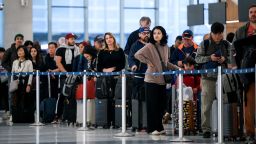UPDATE: Disruptions are escalating for travelers across the United States this weekend as airlines have canceled over 1,700 flights due to a government shutdown that shows no signs of resolution. The FAA has mandated a 4% reduction in domestic flights at 40 major airports, leading to severe delays and cancellations from Friday through Sunday.
Travelers are facing mounting frustration as they scramble to adjust their plans. The ongoing air traffic controller staffing shortages are causing chaos, with more than 800 cancellations reported just on Friday alone, according to flight tracking data from Cirium. “I just don’t want to be stranded at the airport sleeping on a bench,” said Michele Cuthbert from Columbus, Ohio, highlighting the emotional toll on passengers.
Major airlines are bracing for further disruptions. American Airlines plans to cut 220 flights from its Saturday schedule, while United Airlines has announced hundreds of cuts through early next week, including 168 on Saturday and 269 on Tuesday. Southwest Airlines will cancel around 100 flights on Saturday and 150 on Sunday, complying with the FAA order.
The situation could worsen if the shutdown continues. The FAA warns that cancellations could reach 10% by next Friday, and possibly escalate to 15-20% if Congress remains gridlocked. Transportation Secretary Sean Duffy confirmed in an interview that even if the shutdown ends, air traffic controllers might not return to work immediately, exacerbating the crisis.
Travelers are advised to stay informed. Airlines like American, Delta, and Southwest are waiving fees for ticket changes, allowing passengers to adjust their travel plans without incurring extra costs. Barry Biffle, CEO of Frontier Airlines, suggested booking backup tickets on different carriers to avoid being stranded.
Key airports are particularly affected. Washington, DC’s Reagan National Airport is experiencing the most severe disruptions, with nearly 80 flights canceled and almost half of all arrivals delayed. Other heavily impacted locations include Chicago O’Hare, Atlanta Hartsfield-Jackson, and Denver International. The challenges are not limited to the U.S., as international hubs like Amsterdam Schiphol and Toronto Pearson are also reporting significant cancellations.
Travel experts recommend proactive measures for passengers. Check flight statuses frequently, consider purchasing travel insurance, and remember that you are entitled to a full cash refund if your domestic flight is canceled or delayed over three hours.
As the situation develops, travelers are urged to stay updated and prepared for further changes. With the government shutdown still unresolved, the ripple effects on air travel are likely to continue affecting plans nationwide.
Stay tuned for further updates as this story unfolds.
